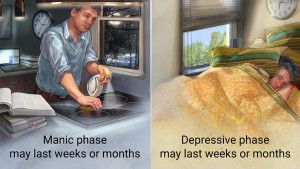
3d Bipolar disorder background
Bipolar disorder throughout the years has gained a bad reputation through media like TV shows or the internet. They use the word “bipolar” as a generic label for someone who is being moody or unreasonable. There are many myths created that need to be looked at and determine whether it is fact or fiction. Three statements I hear constantly is” being bipolar is a character flaw, “They’re just crazy” and “There is no cure”. Bipolar disorder is a mood disorder that deals with a certain part of the brain. This part of the brain is in charge of making decisions, judgment, and moods. The commonly used definition of this disorder is mood swings involving times of depression alternating with periods of euphoria (extreme excitement & happiness). Sometimes they can become extremely energetic then become severely irritation. These intense mood swings are commonly known as the manic phases of bipolar disorder. Most may experience more than one episode of these dramatic mood changes. With this disorder, it is not a constant “mania”. There can be a long period of time in between these episodes without any problems.

Fact or myth?
Having bipolar is a character flaw: MYTH
You can’t choose to be bipolar. You also can’t just turn it off and get yourself together. It is not a figment of imagination. It is a real disorder that takes place in the brain. It is still not completely understood how or why it happens. It is strongly suggested to be linked to genetics (DNA). Head trauma and extreme stress are risks that may lead to bipolar disorder usually if already genetically linked.
Having bipolar means you’re always crazy: MYTH
People can experience a series of highs and lows with times in between that can last months to years with no mood swings. They are not in a constant mania, all the time. Some signs and symptoms of this disorder includes fast talking & topic jumping, lack of sleep, increased sex-drive, extreme happiness, over confidence, meddling, irritation, defensive, depression, anxiousness, suicidal thoughts. Looking over the list you can see there are a number of different moods one may go through during a manic episode. They are not “crazy”.
There is no cure for Bipolar disorder: MYTH
Medication can help stable moods and decrease episodes. It may take a few different trials of medication to individualize the best treatment. Talking with a therapist may help with other issues the individual may be experiencing. Support groups and psychotherapy could also help. Hospitalization may result in severe cases.
There are a number of people who do not understand what bipolar disorder really is or what it’s like to live with the disorder for the rest of their lives. Media gives bipolar a bad rep but is now becoming more recognized by TV shows portraying the difficulties one with bipolar suffers from. It is one thing to read and become educated on this disease but it is another if you know what it feels like to go through it. Ones who suffer from this disorder are not “crazy” or “unmanageable”. With support and therapy, a normal lifestyle can be maintained.
More information on facts and myths about Bipolar Disorder
http://www.heretohelp.bc.ca/factsheet/bipolar-disorder-myths-and-facts
References
Astrês Fernandes, M., Jardel Feitosa Sousa, K. H., Aprígio de Andrade, P. C., Soares de Carvalho, L. C., Dias Pereira, D. B., & Melo Silva, B. J. (2016). BIPOLAR AFFECTIVE DISORDER, CURRENT MANIC EPISODE WITH SYMPTOMS OF PSYCHOTIC AND CARE IN NURSING. Journal Of Nursing UFPE / Revista De Enfermagem UFPE, 10(2), 669-674. doi:10.5205/reuol.8557-74661-1-SM100220163
Janicak, P. G., & Esposito, J. (2015). An Update on the Diagnosis and Treatment of Bipolar Disorder, Part 1: Mania. Psychiatric Times, 32(11), 29-34.
Sullivan, R. J., & Sullivan, S. (2016). AN EMS GUIDE TO DEPRESSION AND BIPOLAR DISORDER…republished from the EMS Reference. EMS World, 45(6), 48-56.

Alexandra,
This is a great post. I lost a niece almost three years ago to suicide. Then and only then did it come out that she had suffered from bipolar disorder for many years. No one talked about it. We heard about many incidents where she was in the hospital for medical reasons but no one mentioned it was ever due to multiple attempts of suicide. Unfortunately my sister was embarrassed by having a daughter with this diagnosis so she never opened up about any of what was going on. I don’t know if I could have helped her but I could have at least pointed her in the right direction for support.
Alexandra I loved your blog post, as someone who suffers from anxiety I can relate to feeling ashamed and stigmatized, although this generation deals better with mental illnesses than the ones in the years past, for instance, my mother was told she was crazy and nothing was wrong with her because in her early twenties she felt paralyzed when faced with leaving the house. She has had feelings of shamefulness for years and also is afraid to admit to having being medicated for what she states as “feeling normal”. We still have a lot of work to do in the mental health field but I feel we are moving towards the right direction. Thank you
Great blog post. Mental Health is such an important topic in our world today. There is much more education on the topic which is so crucial. Police departments are now being trained and educated in mental health. It is so important that we break down the stigma barriers and bring it to the forefront to help those who are suffering with a mental illness but too afraid to seek help. I loved your Ted Talks video as well. Mental illness is in all shapes and forms and Laura proves this.
Wow great post, Alexandra! Your clips were very supportive of your post, I appreciated the way you approached the topic and the evidence you provided. Mental health is a difficult topic to clearly define but you did a great job of providing education about bipolar disorder and helping to break the stigma associated with it.
I loved this post Alexandra!
First of all, it was very nicely organized and caught my eye immediately with the first picture of just the main point of your blog post. I really like how you made it open to a general audience and explained what bipolar disorder is, how there are many misconceptions, and the facts/myths. I also love that you posted a clip from Shameless, because it is such a big hit television show right now and it really gets it to “click” for those who have seen the show. I also like how you leaned towards how you feel about it but you were not over-biased, you simply stated the facts and what can be done to manage this disease. Overall, really great job I enjoyed reading.